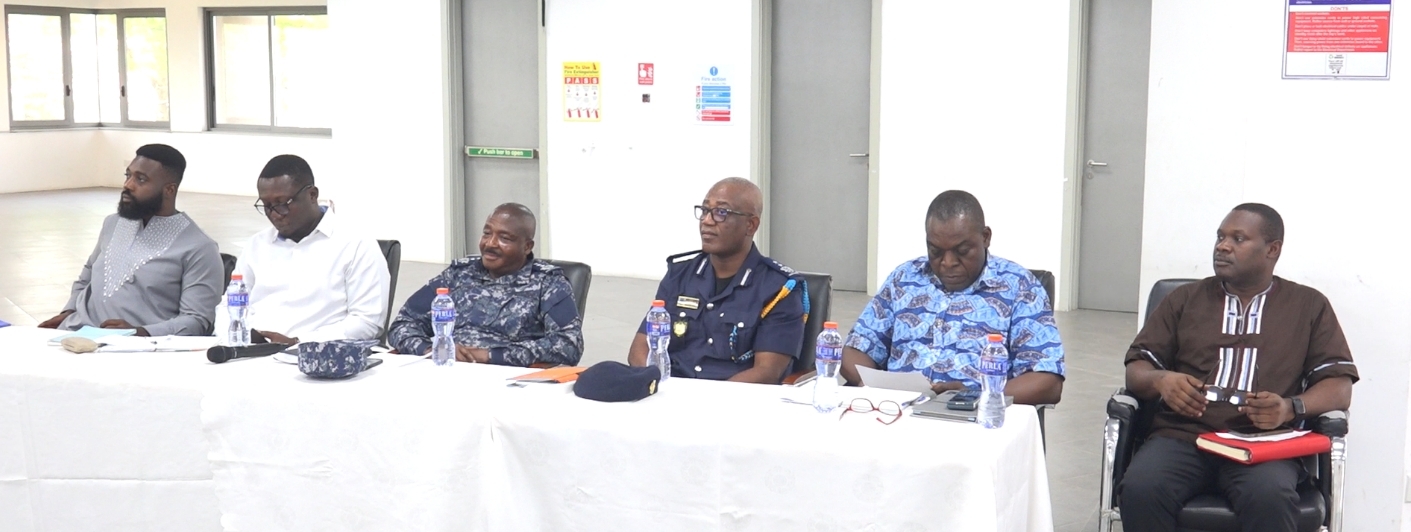
Mr Kofi Nti (second from left) Commissioner General of GRA addressing the press conference.Those with him include Mr Isaac Crentsil and Mr Charles Ansong(second right).
A total of 3,000, representing five per cent of importers in the country, are to be covered under the Cargo Tracking Note (CTN) policy being implemented by the Ghana Revenue Authority (GRA) at the ports.
This is because their imports records exceed the 36 Twenty Foot Equivalent Units (TEUs) per year threshold agreed by stakeholders for the roll out of the policy.
Commissioner-General of the GRA, Emmanuel Kofi Nti, addressing a press conference in Accra yesterday, said all 3000 importers, who are responsible for 65 per cent of all imported containers in the country, would be formally notified through a letter to comply with the policy.
As part of the implementation processes, he said the GRA and the Joint Private Sector Business Consultative Forum, comprising members of the Ghana Union of Traders Association (GUTA), Importers and Exporters Association of Ghana, Ghana Institute of Freight Forwarders, Importers and Exporters Association of Ghana, Food and Beverage Importers Association of Ghana, among others, agreed on introducing exemptions to ensure small and medium-scale importers were free of the policy.
In this regard, he said a threshold, which was 36 TEUs per year for importers would be required to obtain a CTN Number in the country of export was agreed on.
However, importers whose imports were less than the threshold were exempted from CTN compliance and would not be required to produce CTN documentation at the port, Mr Nti stated.
Additionally, businesses that import more than 36 TEUs per year, but could demonstrate that the nature of their imports and turnovers made them small importers, he said, would also be exempted.
Discussing the importance of CTN, the Commissioner-General explained that the CTN piloting period in July, earlier this year, revealed trade malpractices including undervaluation of shipment, concealment of higher rated goods, deliberate misclassification of shipments by importers, manipulation of details of port of origin, volume misrepresentation, over invoicing of shipment, among others, recording more than US$14 million dollars of under declared goods.
A CTN system, he said, would ensure a reliable trade database, real-time trade data, transparent data validation source, short turn-around time for clearance at the ports as well as support Customs in facilitating the movement of legitimate trade and develop risk assessment engine to swiftly address trade malpractices in the import revenue mobilisation process.
In addition to supporting the GRA to maximise revenue collection at the ports, the CTN, would also help the Ghana Ports and Harbours Authority to have a more comprehensive view of global logistic chain, support the Ministry of Finance and Bank of Ghana in forecasting revenue and currency flows from the maritime industry, and help the Ministry of Health to closely monitor and control prohibited pharmaceutical and medical products, Mr Nti stated.
Other ministries and trade organisations including the Ministry of Defense and the Association of Ghana Industries (AGI) would be able to monitor the importation of weapons and make local businesses competitive as foreign imports would pay the right duties.
On the court action brought against the GRA over the implementation of the policy by a freight forwarder, John Kwame Adu Jack, the Commissioner-General said the Authority's legal department would in due time provide the appropriate response.
Mr Nti dismissed claims by some importers that their resistance to the CTN implementation was due to the lack of due process in the award of contract to Messrs Cargo Tracking Note Ghana Limited, stressing that all procurement procedures were followed in securing the services of the company to undertake the implementation of the policy.
Read Full Story













Facebook
Twitter
Pinterest
Instagram
Google+
YouTube
LinkedIn
RSS